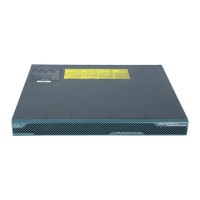1-14
Cisco ASA Series CLI Configuration Guide
Chapter 1 Starting Interface Configuration (ASA 5510 and Higher)
Starting Interface Configuration (ASA 5510 and Higher)
• (Optional) To automatically assign unique MAC addresses to context interfaces, see the
“Automatically Assigning MAC Addresses to Context Interfaces” section on page 1-25.
The MAC address is used to classify packets within a context. If you share an interface, but do not have
unique MAC addresses for the interface in each context, then the destination IP address is used to
classify packets. Alternatively, you can manually assign MAC addresses within the context according to
the “Configuring the MAC Address and MTU” section on page 1-10.
Step 8 Complete the interface configuration according to Chapter 1, “Completing Interface Configuration
(Routed Mode),” or Chapter 1, “Completing Interface Configuration (Transparent Mode).”
Converting In-Use Interfaces to a Redundant or EtherChannel Interface
If you have an existing configuration and want to take advantage of the redundant or EtherChannel
interface feature for interfaces that are currently in use, you will have some amount of downtime when
you convert to the logical interfaces.
This section provides an overview of how to convert your existing interfaces to a redundant or
EtherChannel interface with minimal downtime. See the “Configuring a Redundant Interface” section
on page 1-26 and the “Configuring an EtherChannel” section on page 1-28 fore more information.
• Detailed Steps (Single Mode), page 1-14
• Detailed Steps (Multiple Mode), page 1-19
Detailed Steps (Single Mode)
We recommend that you update your configuration offline as a text file, and reimport the whole
configuration for the following reasons:
• Because you cannot add a named interface as a member of a redundant or EtherChannel interface,
you must remove the name from the interface. When you remove the name from the interface, any
command that referred to that name is deleted. Because commands that refer to interface names are
widespread throughout the configuration and affect multiple features, removing a name from an
in-use interface at the CLI or in ASDM would cause significant damage to your configuration, not
to mention significant downtime while you reconfigure all your features around a new interface
name.
• Changing your configuration offline lets you use the same interface names for your new logical
interfaces, so you do not need to touch the feature configurations that refer to interface names. You
only need to change the interface configuration.
• Clearing the running configuration and immediately applying a new configuration will minimize the
downtime of your interfaces. You will not be waiting to configure the interfaces in real time.
Step 1 Connect to the ASA; if you are using failover, connect to the active ASA.
Step 2 If you are using failover, disable failover by entering the no failover command.
Step 3 Copy the running configuration by entering the more system:running-config command and copying the
display output to a text editor.
Be sure to save an extra copy of the old configuration in case you make an error when you edit it.

